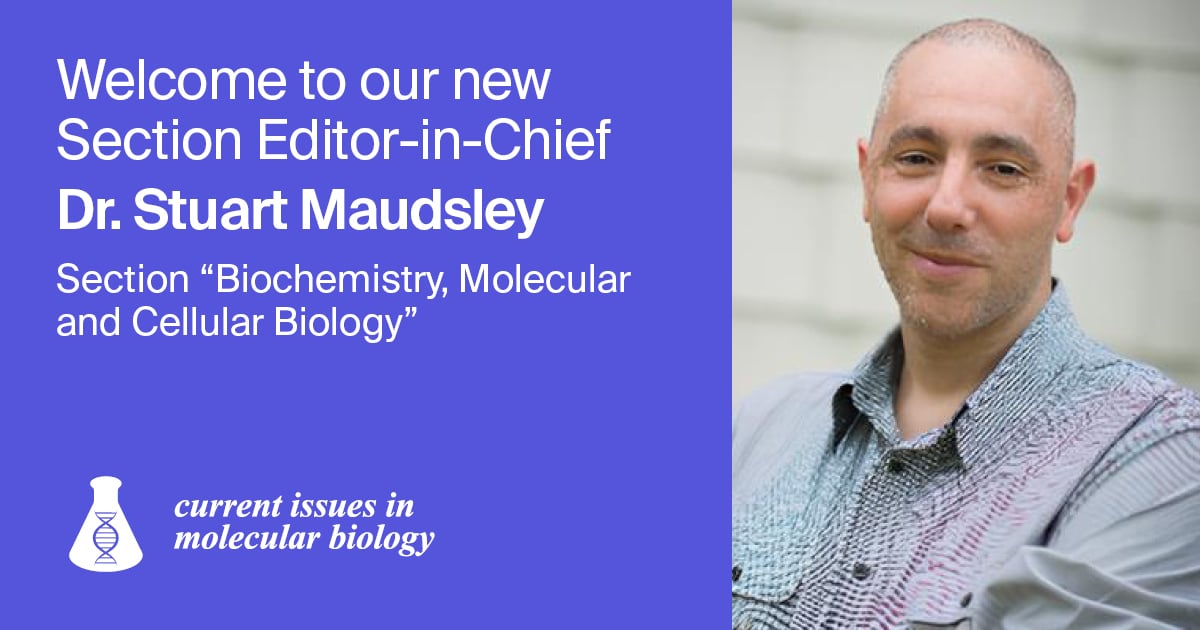
Current Issues in Molecular Biology | Interview with Dr. Stuart Maudsley, Section Editor-in-Chief of “Biochemistry, Molecular and Cellular Biology” Section
The CIMB Editorial Office would like to warmly welcome Dr. Stuart Maudsley as the newly appointed Section Editor-in-Chief of the “Biochemistry, Molecular and Cellular Biology” Section of Current Issues in Molecular Biology (CIMB, ISSN: 1467-3045).
Dr. Maudsley graduated from the University of Leeds with First Class Honors in Pharmacology and was awarded the Pfizer Prize for exceptional undergraduate research. He was awarded the Akroyd, Brotherton and Brown Scholarship to pursue his Ph.D. studies at Leeds. Following his successful studies, Dr. Maudsley received a Howard Hughes Medical Institute Fellowship to train with Prof. Robert Lefkowitz, the 2012 Nobel Laureate in Chemistry, at Duke University. Following his Fellowship, Dr. Maudsley was then recruited to be principal investigator of the “Receptor Biology” Section at the Medical Research Council’s Human Reproductive Sciences Unit at the University of Edinburgh. Dr. Maudsley was next recruited to be the Head of the Receptor Pharmacology Unit at the National Institutes of Health (NIH-NIA) at the Johns Hopkins Medical Center. Following his time at the NIH, Dr. Maudsley returned to Europe to serve as the Director of the VIB Department of Molecular Genetics, Director of the Antwerp VIB Bioinformatics Section, and Vice-Chair and then Chair of the Department of Biomedical Sciences at the University of Antwerp. Following this successful period, Dr. Maudsley was recruited to the United States to serve as the Chief of the Receptor Biology Lab at the H. Lee Moffitt Cancer Center in Florida. In addition, Dr. Maudsley is the Co-Founder of HeptOME, a groundbreaking drug discovery start-up.
His current research lab focusses on the development of G protein-coupled receptor (GPCR)-based therapeutic strategies for multiple aging-related cancers, as well as other aging-associated conditions such as metabolic syndrome, chronic kidney disease, and neurodegenerative dementias. Dr. Maudsley has published 203 research articles and currently possesses an h-index of 73. Dr. Maudsley has presented his research in multiple continents and acts as a Senior Advisor to multiple governmental institutions in Europe, Asia, and the United States. Dr. Maudsley is a regular reviewer for many of the world’s top research publications, such as Science, Nature, Proceedings of the National Academy of Science, Cell, and Nature Medicine.
The following is a short Q&A with Dr. Stuart Maudsley, who shared his vision for the journal with us, as well as his views of the research area and open access publishing:
1. What appealed to you about our journal that made you want to take on the role of Section Editor-in-Chief of the “Biochemistry, Molecular and Cellular Biology” Section?
The “Biochemistry, Molecular and Cellular Biology” Section is an interesting source of recent research articles that span an eclectic range of studies. In this respect, most general and even specifically focused readers can find something of interest in each edition.
2. Among your many professional roles, which do you find the most significant and fulfilling?
I think the most important role that I have is being a research mentor for the scientists of the next generation.
3. How do you maintain a balance between research commitments and personal life?
I try and make all of my time a symbiotic process between research and my personal life—they both need each other and flourish equally when there is harmony between them.
4. Scientific research can be a source of considerable stress, affecting not only graduate students but also their mentors. What advice do you have for managing stress in scientific research?
Managing stress in scientific research—especially in high-stakes fields like drug discovery and biotech startups—requires a mix of mental resilience, strategic planning, and self-care. Understanding that effective mental wellbeing is an important part of developing a more nuanced approach to maximizing creativity and productivity is important.
5. Could you discuss individuals or experiences that have significantly influenced your research career?
My doctoral mentor, Robert J. Lefkowitz (2012 Nobel Laureate in Chemistry), is a genius with respect to his communication skills. He dedicated so much of his time to personal, one-on-one conversations. Nearly every day, he would engage with you about your work in a way that felt like you were the only person he had spoken to that day. His infectious enthusiasm not only fueled your own excitement but also reinforced the significance of your research, both for the lab and for the broader scientific community.
6. In your view, what are the essential components of a high-quality research paper? Is it primarily the result of groundbreaking research with substantial scientific merit, or does it hinge on well-conceived ideas and proficient writing?
The most important things that a research paper should focus on are innovation, impact, style, and message. In addition to these, I always enjoy reading articles that set the state of the art in science for years to come.
7. What do you think of the development of open access in the publishing field?
The promotion of open access in scientific research is as important as the actual content of the research. Information should be shared and be available for augmented interaction, investigation, and further analysis.
8. What does the future of this field of research look like?
Understanding and effectively controlling (for therapeutic values) complex cellular biology may represent the next area of intense scientific growth for this century. I predict that the future will be strongly controlled by both synthetic biology and effectively leveraged quantum computing.
We wish him every success in his new position, and we look forward to his contributions to the journal.
